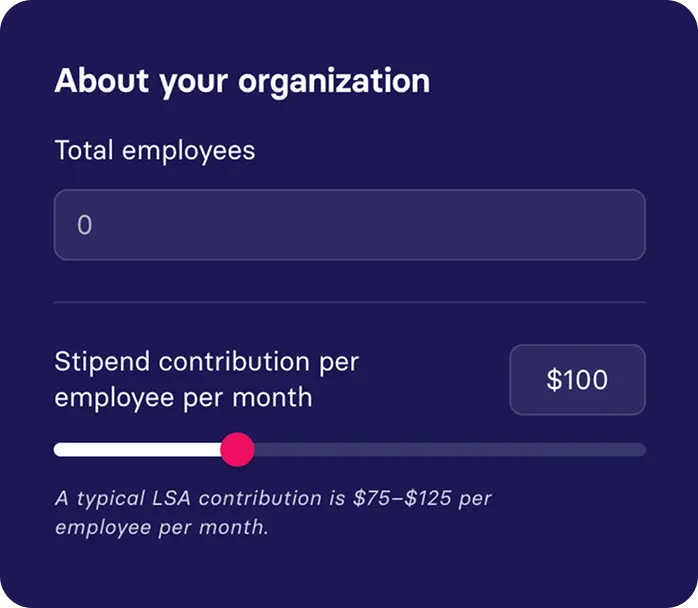In this post
Lorem ipsum dolor sit amet
Lorem ipsum dolor sit amet
Family responsibilities don’t always begin with a birth certificate. For many employees, they start long before, with fertility treatments, doctor’s visits, adoption paperwork, and the emotional weight of wondering if and how it will all come together. And for these team members, that invisible workload runs parallel to their full-time job.
When companies fail to recognize or support that load, employees feel it—and often, they leave. To avoid this and support retention, employers can offer family forming benefits. These programs play an important role in shaping the culture, loyalty, and longevity of your workforce.
This guide explores how family forming benefits reduce stress and drive retention.
Work-life balance is key to a resilient workforce
At their core, family benefits are about work-life balance and acknowledging that your people exist beyond their office cubicle or a green status light in Slack. Many of your employees are trying to start, grow or support a family outside of working hours. And that responsibility has a knock-on effect on their ability to perform well in their roles.
When companies don’t offer support during those life stages—whether it’s navigating family planning, accessing paid parental leave, or managing childcare—employees are left to juggle high-stakes personal stress alongside daily work expectations. And from an employer’s perspective, that imbalance often shows up in productivity, employee satisfaction, and ultimately, retention.
In fact, 95% of employees say it’s important to work for an organization that respects them. Part of that respect is about recognizing when employees need family and medical leave, mental health resources, or other practical employee benefits that acknowledge the real pressures employees face outside of work when they’re trying to build a family.
Right now, those pressures are high. According to the American Psychology Association, 77% of workers report recent stress. Many cite emotional exhaustion (31%), disengagement (26%), and even a desire to quit (23%)—all symptoms that are intensified when they face personal challenges without employer support.
Family forming benefits offer a direct way to reduce that strain. They help employees manage major life transitions without sacrificing health or performance—and that balance keeps them resilient, loyal, and productive.
The impact of family-friendly benefits
Family forming benefits are workplace programs that assist employees with building or expanding a family. They might include support for reproductive services, surrogacy, adoption assistance, and mental health services. Overall, family benefits give employees room to manage some of life’s biggest moments without burning out or stepping back. They relieve pressure at home so people can stay focused and present at work. And by doing so, the ripple effects are both measurable and meaningful.
Reduce financial stress
Family forming sometimes comes with a hefty price tag—one that many employees can’t afford without help. Fertility treatments, surrogacy, and adoption often cost tens (or hundreds) of thousands of dollars, placing a financial burden on individuals already navigating emotionally complex situations.
- One In Vitro Fertilization (IVF) cycle costs an average of $21,600—and some people need multiple rounds, totaling close to $50,000.
- Intracytoplasmic Sperm Injection (ICSI) is a procedure often used alongside IVF, which adds $800 to $2,500 per cycle.
- Surrogacy ranges from $110,000 to $170,000 in the U.S., including agency fees, surrogate compensation, legal fees, and any fertility related costs.
Without fertility benefits, employees may delay treatment, take on debt, or leave their jobs in search of a more competitive benefits package. Even partial coverage signals that a company sees and supports the full scope of employee needs.
Alleviate the emotional toll
The emotional side of family planning is just as real. Fertility struggles and caregiving duties often lead to isolation, anxiety, and depression—especially when employees feel they have to hide what they’re going through.
- 23% of those undergoing treatment experience anxiety disorders (Identifying Mental Health Issues Associated with Infertility)
- 39% of women undergoing infertility treatment meet the criteria for major depressive disorder
- 56% of women and 32% of men have significant symptoms of depression
- 76% of women and 61% of men reported significant anxiety during fertility treatment (The relationship between stress and infertility)
Supportive benefits can’t erase that emotional strain, but they can create a sense of safety and validation. When employees feel their challenges are understood and supported, they’re more likely to stay engaged, loyal, and present, even during difficult seasons.
Instill a sense of belonging to grow loyalty
Family forming benefits drive loyalty because they support what matters most to people. When employers help someone start or grow a family, they become part of that employee’s life story and build a sense of trust that few other benefits can match.
That trust feeds a deeper sense of belonging and plays a significant role in retention. When employees feel personally supported, they’re far more likely to stay and contribute at a high level. The numbers reinforce this:
- 42% of employee turnover is preventable
- 30% of those exits are tied to benefits and compensation
- The remaining 70% relate to daily experience, including whether employees feel valued and understood by their manager (Gallup)
- Turnover drops by 21-51% in organizations with high engagement
- Absenteeism falls by 78%
- Productivity increases by 18%
- Profitability improves by 23% (Gallup)
These aren’t soft metrics but business outcomes tied directly to how supported your people feel—especially during critical life moments.
Increase tenure and productivity
Employees navigating family-forming often carry invisible stress that affects their focus and reliability at work. When that financial, emotional, or logistical stress goes unsupported, it chips away at performance and shortens tenure.
47% of employees say most of their stress comes from work. Additionally, 77% report stress has harmed their mental health, and 71% say it’s affected personal relationships. Financially stressed employees lose an average of 7 hours of productivity each week.
These costs quickly add up. U.S. businesses lose an estimated $183 billion per year due to decreased productivity, and $300 billion annually when factoring in stress-related absenteeism and turnover.
Family-forming benefits ease that burden. When paired with policies like flexible working hours, they give employees the space to manage major life transitions without stepping back professionally. The result is fewer missed days, stronger collaboration, and healthier employee morale across teams, all of which contribute to better long-term performance and retention.
Support your employees at all stages of their family journey
Every employee’s path to building a family is unique. So, providing benefits that cater to these diverse needs also demonstrates a commitment to their well-being and fosters a supportive workplace culture.
Benepass offers a comprehensive Family Care and Formation Account designed to support employees through various life stages and family structures. This flexible benefit can be tailored to cover a range of services, including:
- Fertility treatments: Assisting employees like Grace, who used her account to fund fertility services through Kindbody while planning for her first child.
- Childcare support: Helping parents like Hector, who subsidized daycare expenses for his 4-year-old son, resulting in a more balanced work schedule.
- Adoption services: Supporting employees like Andrea, who paid for local adoption services for her second child.
To learn more about how Benepass can enhance your employee benefits package, book a free demo, or contact sales@getbenepass.com to connect with a benefits specialist today.







